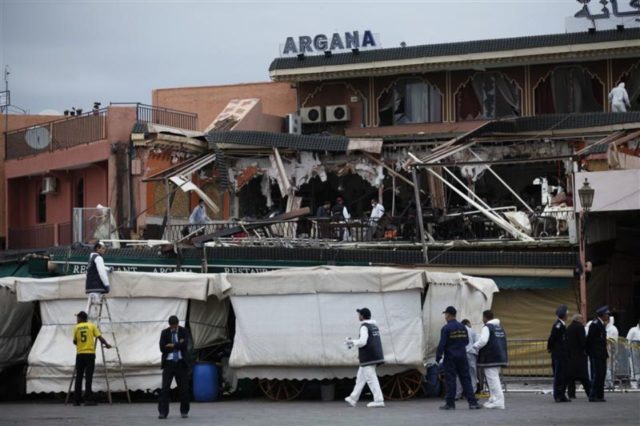
Briefs
Publication: Terrorism Monitor Volume: 14 Issue: 24
By:

MOROCCO: SECURITY SERVICES MAKE GAINS AS TERROR THREAT GROWS
Moroccan investigators arrested an alleged jihadist with links to al-Qaeda in the city of Azrou in November. The man, a computer engineer, had disseminated jihadist propaganda and was suspected of involvement in online banking fraud that had allowed him to seize large sums of money, according to the authorities. Reports quoting the interior ministry linked the man to al-Qaeda and Jabat Fateh al-Sham in Syria (Morocco World News, November 20).
The arrest follows the successful dismantling in June of a supposed Islamic State (IS) terrorist cell, composed of six people with links to IS in Libya. The group was operational in the cities of Agadir, Amzmiz, Chichaoua and Laqliaâ and was planning suicide attacks, according to Moroccan authorities (Tel Quel, July 2016). In May, the security services arrested a 33-year-old Chadian man accused of leading an IS cell in Tangiers. He was suspected of planning an attack equivalent to the devastating Casablanca bombings in 2003, in which 33 people were killed; in November, a court jailed him for 20 years on terrorism charges (Morocco World News, November 11).
Morocco has seen a number of attacks since the 2003 Casablanca bombing, including one blamed on al-Qaeda that killed 17 people in Marrakesh in 2011. But for a country that is a key exporter of Islamist recruits to jihadist causes abroad – by some estimates at least 1,500 Moroccans are fighting for IS in Syria and Iraq, and that number may even be higher – its security services have proved relatively successful at countering terrorist threats at home (Daily Sabah, November 8, 2015). Its foreign intelligence service also maintains good relations with its European counterparts. Following the attacks in Paris in 2015, the Moroccan authorities tipped off French police leading to the raid on the flat where the attacks’ alleged mastermind, Abdelhamid Abaaoud, a Belgium national of Moroccan origin, was hiding out.
The success is partly a matter of experience – the authorities have been tracking Moroccan fighters at least since the 1979–1989 Soviet-Afghan war, in which hundreds of Moroccans took part. But Morocco also benefits from having one of the region’s more open political landscapes, which has allowed it counter negative socio-economic factors such as high youth unemployment. Morocco’s successful weathering of the “Arab Spring,” and its measured response to the recent protests over the killing of a fisherman – he was crushed to death in a garbage truck after refusing to pay a bribe to police – are a testament to this (New Arab, October 30).
Nonetheless, the Moroccan authorities must remain vigilant. In an audio recording obtained by al-Jazeera in May, the head of the so-called Islamic State in the Greater Sahara, Adnan Abu Walid al-Sahrawi, threatened attacks on Morocco (al-Jazeera, May 4). While it is highly doubtful al-Sahrawi’s group has that kind of capacity, the recent arrests indicate Morocco remains at risk from attacks by domestic terrorist cells.
IRAQ: SECTARIAN TENSIONS WILL OUTLAST MOSUL OFFENSIVE
As efforts to recapture the Iraqi city of Mosul from Islamic State (IS) militants move into their third month, Iraqi security forces in the capital are struggling to prevent attacks in and around Baghdad, a reminder of the sectarian tensions that will persist even after the Mosul offensive is concluded.
In what is now a fairly routine announcement, the Iraqi defense ministry said on December 1 that security forces had arrested four men linked to IS’s so-called Wilayat Baghdad. Reportedly the group was planning attacks on security forces and civilian targets. Such attacks are a near daily occurrence. Indeed, in the days following the arrests, the capital was hit by another series of blasts, including attacks using “sticky” bombs attached to the underside of civilian busses, which left at least 2 people dead and 13 more wounded (Iraqi News, December 7).
Wilayat Baghdad, which operates as a kind of provincial arm of IS, has been behind scores of bombings over the last few years. In March 2015, Iraqi intelligence rounded up more than 30 alleged members of the group reportedly responsible for 52 attacks in areas around the capital (al-Arabiya, March 15, 2015). Two months later, Iraqi military intelligence claimed to have killed the group’s leader, a man they named Abu Walid (Iraqi News, May 12, 2015; Tasnim, May 13, 2015). Those successes, however, brought only the most temporary of reprieves. Wilayat Baghdad has remained active, continuing to release propaganda videos online and staging attacks around the capital. It is unlikely the eventual capture of Mosul, whenever that happens, will put an end to this.
Part of the problem is that the Sunni areas surrounding Baghdad, the so-called “Baghdad belt,” are still a fertile area for recruitment by insurgents. The situation there was made worse in the build-up to the Mosul offensive because Shia militias were turned loose on areas north and east of the capital nominally to maintain security, but indiscriminate violence and looting exacerbated sectarian tensions.
In February, a plan to build a concrete security barrier around Baghdad, which had been first mooted several years earlier, was resurrected in the hope of preventing infiltration from insurgents (al-Arabiya, February 3). Such a plan is fraught with problems. It alienates communities outside the capital and does little to prevent sleeper cells already present in Baghdad. Further, for many the move is simply a plot for a Shia land grab (al-Jazeera, February 10).
IS likes to use the persistent attacks on Baghdad to demonstrate that, even as it loses ground, it retains the ability to strike across the country. But the attacks are also indicative of Iraq’s sectarian tensions, an issue that will not be brought under control with the eventual re-capture of Mosul.




